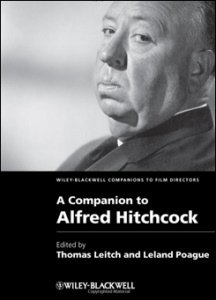A Companion to Alfred Hitchcock (2011) edited by Thomas Leitch & Leland Poague
 | |
| Thomas Leitch & Leland Poague | |
| Wiley-Blackwell (2011) | |
| ISBN 1405185384 (hardback) | |
| LibraryThing | |
Product Links
Synopsis
The most comprehensive volume ever published on Alfred Hitchcock, covering his career and legacy as well as the broader cultural and intellectual contexts of his work. Contains thirty chapters by the leading Hitchcock scholars. Covers his long career, from his earliest contributions to other directors’ silent films to his last uncompleted last film Details the enduring legacy he left to filmmakers and audiences alike.
Contents
Part 1 - Background
- Hitchcock's Lives - Thomas Leitch
- Hitchcock's Literary Sources - Ken Mogg
- Hitchcock and Early Filmmakers - Charles Barr
- Hitchcock's Narrative Modernism: Ironies of Fictional Time - Thomas Hemmeter
Part 2 - Genre
- Hitchcock and Romance - Lesley Brill
- Family Plots: Hitchcock and Melodrama - Richard R. Ness
- Conceptual Suspense in Hitchcock's Films - Paula Marantz Cohen
Part 3 - Collaboration
- "Tell Me the Story So Far": Hitchcock and His Writers - Leland Poague
- Suspicion: Collusion and Resistance in the Work of Hitchcock's Female Collaborators - Tania Modleski
- A Surface Collaboration: Hitchcock and Performance - Susan White
Part 4 - Style
- Aesthetic Space in Hitchcock - Brigitte Peucker
- Hitchcock and Music - Jack Sullivan
- Some Hitchcockian Shots - Murray Pomerance
Part 5 - Development
- Hitchcock's Silent Cinema - Sidney Gottlieb
- Gaumont Hitchcock - Tom Ryall
- Hitchcock Discovers America: The Selznick-Era Films - Ina Rae Hark
- From Transatlantic to Warner Bros. - David Sterritt
- Hitchcock, Metteur-en-scène: 1954-60 - Joe McElhaney
- The Universal Hitchcock - William Rothman
Part 6 - Auteurism
- French Hitchcock, 1945–55 - James M. Vest
- Lost in Translation? Listening to the Hitchcock–Truffaut Interview - Janet Bergstrom
- Robin Wood's Hitchcock - Harry Oldmeadow
Part 7 - Ideology
- Accidental Heroes and Gifted Amateurs: Hitchcock and Ideology - Toby Miller & Noel King
- Hitchcock and Feminist Criticism: From Rebecca to Marnie - Florence Jacobowitz
- Queer Hitchcock - Alexander Doty
Part 8 - Ethics
- Hitchcock and Philosophy - Richard Gilmore
- Hitchcock's Ethics of Suspense: Psychoanalysis and the Devaluation of the Object - Todd McGowan
- Occasions of Sin: The Forgotten Cigarette Lighter and Other Moral Accidents in Hitchcock - George Toles
Part 9 - Beyond Hitchcock
Reviews
- Choice (2011) - A Companion to Alfred Hitchcock
- Hitchcock Annual (2011) - Hitchcock Now
- Quarterly Review of Film and Video (2012) - A Companion to Alfred Hitchcock
- Reference Reviews (2012) - A Companion to Alfred Hitchcock
This impressive anthology proves that there are plenty of new things to say about Hitchcock. A wide ranging and consistently intelligent compendium, it features essays on virtually every aspect of the great director′s work by an array of his most astute commentators.
— James Naremore (Indiana University)
A superior addition to film studies, with essays from scholarly voices both established and new. Hitchcock specialists – and others – will find much to enlighten, discuss and debate.
— Leonard J. Leff (Oklahoma State University)
The authoritative cultural and historical perspectives of the essays, written by prominent scholars, provide an ideal complement to Robin Wood’s close readings of Hitchcock’s films.
— Elisabeth Weis (author of The Silent Scream: Alfred Hitchcock′s Sound Track)
Readers who know a lot about Hitchcock will find this new Companion hard to put down, and neophytes could not find a better introduction to the ever–changing, ever–surprising field of Hitchcock studies.
— Bill Krohn
Poague and Leitch’s A Companion to Hitchcock provides an excellent snapshot of the best and brightest current thinking on Hitchcock by a range of international scholars who offer new ideas about his life and work––his status as an auteur and his engagement with his collaborators, his unique stylistic concerns and his indebtedness to generic conventions, his moral vision and the ideological effects of his narrative choices.
— John Belton (Rutgers University)
